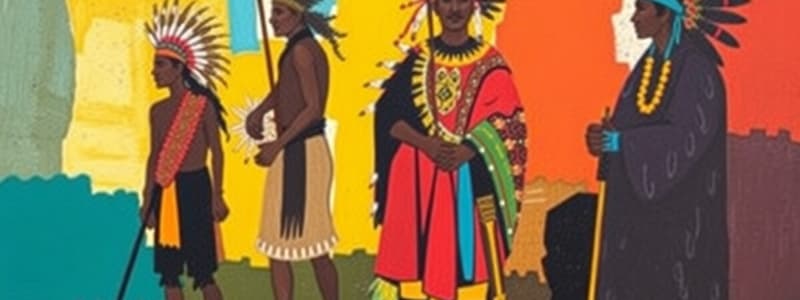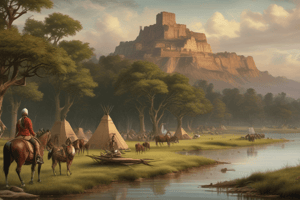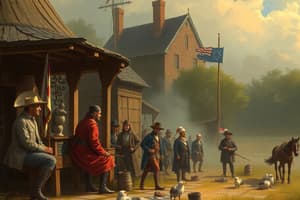Podcast
Questions and Answers
Who founded the Puritan colony and referred to it as a 'city upon a hill'?
Who founded the Puritan colony and referred to it as a 'city upon a hill'?
- John Rolfe
- William Bradford
- Pocahontas
- John Winthrop (correct)
What was John Rolfe known for in the Jamestown colony?
What was John Rolfe known for in the Jamestown colony?
- Successfully farming tobacco (correct)
- Leading the colony after John Smith
- Exploring Chesapeake Bay
- Being Pocahontas's husband
What significant event did William Bradford organize one year after the foundation of Plymouth Colony?
What significant event did William Bradford organize one year after the foundation of Plymouth Colony?
- A trade agreement with Native Americans
- The first Thanksgiving celebration (correct)
- The marriage of Pocahontas
- A religious revival meeting
What was a harsh reality faced by the Puritans during their first winter in Plymouth Colony?
What was a harsh reality faced by the Puritans during their first winter in Plymouth Colony?
What misconception do some historians have regarding Thanksgiving and William Bradford?
What misconception do some historians have regarding Thanksgiving and William Bradford?
What was the ruling of the Sandford case regarding people of African descent?
What was the ruling of the Sandford case regarding people of African descent?
Which of the following crops was not typically classified as a 'slave crop' in the Southern economy?
Which of the following crops was not typically classified as a 'slave crop' in the Southern economy?
What movement advocated for the immediate abolition of slavery?
What movement advocated for the immediate abolition of slavery?
What was the outcome of John Brown's raid on Harpers Ferry?
What was the outcome of John Brown's raid on Harpers Ferry?
Which state was the first to secede from the Union in December 1860?
Which state was the first to secede from the Union in December 1860?
What was President Lincoln’s primary concern regarding secession?
What was President Lincoln’s primary concern regarding secession?
What significant event took place on April 12, 1861?
What significant event took place on April 12, 1861?
Which of the following was a common misconception among supporters of colonization?
Which of the following was a common misconception among supporters of colonization?
Who was the President of the Confederacy during the Civil War?
Who was the President of the Confederacy during the Civil War?
What significant event happened in July 1863 that marked Union victories?
What significant event happened in July 1863 that marked Union victories?
What was the primary purpose of the Emancipation Proclamation?
What was the primary purpose of the Emancipation Proclamation?
What major change occurred regarding the United States after the Civil War?
What major change occurred regarding the United States after the Civil War?
Which amendments were introduced to ensure civil rights for former slaves?
Which amendments were introduced to ensure civil rights for former slaves?
What event marked the beginning of Reconstruction in the United States?
What event marked the beginning of Reconstruction in the United States?
Who assassinated Abraham Lincoln?
Who assassinated Abraham Lincoln?
What was the economic impact of the Civil War on the South?
What was the economic impact of the Civil War on the South?
What euphemism was used in the South to refer to the period before the Civil War, reflecting a sense of nostalgia for slavery?
What euphemism was used in the South to refer to the period before the Civil War, reflecting a sense of nostalgia for slavery?
What economic event in 1873 contributed to the North's decreased concern for controlling the South?
What economic event in 1873 contributed to the North's decreased concern for controlling the South?
Which legal mechanism required a potential voter to pay a tax before voting, disproportionately affecting former slaves?
Which legal mechanism required a potential voter to pay a tax before voting, disproportionately affecting former slaves?
What Supreme Court case established the principle of 'separate but equal' in 1896?
What Supreme Court case established the principle of 'separate but equal' in 1896?
What did Booker T. Washington advocate for African Americans to achieve political rights?
What did Booker T. Washington advocate for African Americans to achieve political rights?
What legislation was part of the disenfranchisement measures that included requirements like literacy tests and poll taxes?
What legislation was part of the disenfranchisement measures that included requirements like literacy tests and poll taxes?
Which group established laws enforcing racial segregation in public spaces during the 1870s to 1890s?
Which group established laws enforcing racial segregation in public spaces during the 1870s to 1890s?
What factor contributed to Southern states regaining autonomy and Democratic control by 1877?
What factor contributed to Southern states regaining autonomy and Democratic control by 1877?
What was a primary goal of the Progressive Era?
What was a primary goal of the Progressive Era?
Which Act was meant to regulate monopolies in the railroad industry?
Which Act was meant to regulate monopolies in the railroad industry?
What was one significant impact of the Pendleton Act?
What was one significant impact of the Pendleton Act?
What was the significance of the Wounded Knee Massacre in 1890?
What was the significance of the Wounded Knee Massacre in 1890?
Who were the muckrakers?
Who were the muckrakers?
What was a characteristic of yellow journalism?
What was a characteristic of yellow journalism?
Which of these was specifically a result of the 17th Amendment?
Which of these was specifically a result of the 17th Amendment?
During which time period did the Gilded Age occur?
During which time period did the Gilded Age occur?
What was a common reason for the old waves of immigration in the mid-19th century?
What was a common reason for the old waves of immigration in the mid-19th century?
What was a primary criticism of the reforms during the Progressive Era?
What was a primary criticism of the reforms during the Progressive Era?
What was one of the main goals of Nixon's diplomacy with China?
What was one of the main goals of Nixon's diplomacy with China?
What foreign policy approach did Carter prefer?
What foreign policy approach did Carter prefer?
What term was used to refer to Reagan's plan for a missile defense system?
What term was used to refer to Reagan's plan for a missile defense system?
Which event marked the beginning of the end of the Cold War?
Which event marked the beginning of the end of the Cold War?
What was a consequence of the Iran-Contra Affair for Reagan's presidency?
What was a consequence of the Iran-Contra Affair for Reagan's presidency?
What was a key feature of Reaganomics?
What was a key feature of Reaganomics?
What was the primary objective of Operation Desert Storm?
What was the primary objective of Operation Desert Storm?
What scandal during Clinton's presidency led to impeachment proceedings?
What scandal during Clinton's presidency led to impeachment proceedings?
During the Gulf War, what was Iraq's primary motivation for invading Kuwait?
During the Gulf War, what was Iraq's primary motivation for invading Kuwait?
What was a notable consequence of the 2000 election?
What was a notable consequence of the 2000 election?
Flashcards
Puritan Colony
Puritan Colony
A British colony in America founded by Puritans, aiming to be a model Christian society.
John Winthrop
John Winthrop
Puritan leader of the Massachusetts Bay Colony; preached "city upon a hill" sermon.
American Exceptionalism
American Exceptionalism
Belief that America is unique and superior due to its values and history.
Jamestown Colony
Jamestown Colony
Signup and view all the flashcards
John Smith
John Smith
Signup and view all the flashcards
Pocahontas
Pocahontas
Signup and view all the flashcards
John Rolfe
John Rolfe
Signup and view all the flashcards
Plymouth Colony
Plymouth Colony
Signup and view all the flashcards
William Bradford
William Bradford
Signup and view all the flashcards
First Thanksgiving
First Thanksgiving
Signup and view all the flashcards
Civil War Generals
Civil War Generals
Signup and view all the flashcards
Civil War Casualties
Civil War Casualties
Signup and view all the flashcards
Civil War Economic Impact
Civil War Economic Impact
Signup and view all the flashcards
Emancipation Proclamation
Emancipation Proclamation
Signup and view all the flashcards
13th Amendment
13th Amendment
Signup and view all the flashcards
Reconstruction Era
Reconstruction Era
Signup and view all the flashcards
Gettysburg Address
Gettysburg Address
Signup and view all the flashcards
14th Amendment
14th Amendment
Signup and view all the flashcards
15th Amendment
15th Amendment
Signup and view all the flashcards
Sandford v. Illinois (1857)
Sandford v. Illinois (1857)
Signup and view all the flashcards
Antebellum South
Antebellum South
Signup and view all the flashcards
"Slave Crops"
"Slave Crops"
Signup and view all the flashcards
Abolitionist Movement
Abolitionist Movement
Signup and view all the flashcards
Gradualism
Gradualism
Signup and view all the flashcards
Immediatism
Immediatism
Signup and view all the flashcards
Colonization
Colonization
Signup and view all the flashcards
John Brown's Raid
John Brown's Raid
Signup and view all the flashcards
Secession
Secession
Signup and view all the flashcards
Confederacy
Confederacy
Signup and view all the flashcards
Fort Sumter
Fort Sumter
Signup and view all the flashcards
Civil War
Civil War
Signup and view all the flashcards
Post-Civil War South
Post-Civil War South
Signup and view all the flashcards
Lost Cause
Lost Cause
Signup and view all the flashcards
Compromise of 1877
Compromise of 1877
Signup and view all the flashcards
Disenfranchisement
Disenfranchisement
Signup and view all the flashcards
Poll Tax
Poll Tax
Signup and view all the flashcards
Mississippi Plan
Mississippi Plan
Signup and view all the flashcards
Jim Crow Laws
Jim Crow Laws
Signup and view all the flashcards
Plessy v. Ferguson (1896)
Plessy v. Ferguson (1896)
Signup and view all the flashcards
Frederick Douglass
Frederick Douglass
Signup and view all the flashcards
Booker T. Washington
Booker T. Washington
Signup and view all the flashcards
Economic Crisis of 1873
Economic Crisis of 1873
Signup and view all the flashcards
Gilded Age Dates
Gilded Age Dates
Signup and view all the flashcards
Pendleton Act
Pendleton Act
Signup and view all the flashcards
Interstate Commerce Act
Interstate Commerce Act
Signup and view all the flashcards
Gold Standard Act
Gold Standard Act
Signup and view all the flashcards
Immigration Waves
Immigration Waves
Signup and view all the flashcards
Nativism
Nativism
Signup and view all the flashcards
Chinese Exclusion Act
Chinese Exclusion Act
Signup and view all the flashcards
Indian Wars
Indian Wars
Signup and view all the flashcards
Wounded Knee Massacre
Wounded Knee Massacre
Signup and view all the flashcards
Labor Day
Labor Day
Signup and view all the flashcards
Haymarket Bombing
Haymarket Bombing
Signup and view all the flashcards
American Federation of Labor
American Federation of Labor
Signup and view all the flashcards
Progressive Era
Progressive Era
Signup and view all the flashcards
Direct Democracy
Direct Democracy
Signup and view all the flashcards
Yellow Journalism
Yellow Journalism
Signup and view all the flashcards
Muckrakers
Muckrakers
Signup and view all the flashcards
CIA assassination of Allende
CIA assassination of Allende
Signup and view all the flashcards
Nixon's China visit
Nixon's China visit
Signup and view all the flashcards
Carter's foreign policy
Carter's foreign policy
Signup and view all the flashcards
Iranian Revolution
Iranian Revolution
Signup and view all the flashcards
Soviet-Afghan War
Soviet-Afghan War
Signup and view all the flashcards
Carter's Olympics boycott
Carter's Olympics boycott
Signup and view all the flashcards
Reagan's SDI
Reagan's SDI
Signup and view all the flashcards
Reagan's 'Evil Empire' Speech
Reagan's 'Evil Empire' Speech
Signup and view all the flashcards
Iran-Contra Affair
Iran-Contra Affair
Signup and view all the flashcards
Fall of the Berlin Wall
Fall of the Berlin Wall
Signup and view all the flashcards
Reunification of Germany
Reunification of Germany
Signup and view all the flashcards
Dissolution of the Soviet Union
Dissolution of the Soviet Union
Signup and view all the flashcards
Reagan Democrats
Reagan Democrats
Signup and view all the flashcards
Televangelism
Televangelism
Signup and view all the flashcards
Reaganomics
Reaganomics
Signup and view all the flashcards
First Gulf War
First Gulf War
Signup and view all the flashcards
Operation Desert Storm
Operation Desert Storm
Signup and view all the flashcards
New Democrats
New Democrats
Signup and view all the flashcards
Clinton's domestic policy emphasis
Clinton's domestic policy emphasis
Signup and view all the flashcards
Contract with America
Contract with America
Signup and view all the flashcards
Don't Ask, Don't Tell
Don't Ask, Don't Tell
Signup and view all the flashcards
Al-Qaeda
Al-Qaeda
Signup and view all the flashcards
Monica Lewinsky
Monica Lewinsky
Signup and view all the flashcards
Clinton impeachment
Clinton impeachment
Signup and view all the flashcards
2000 election dispute
2000 election dispute
Signup and view all the flashcards
Study Notes
Historical Overview of the USA
- Christopher Columbus landed on the Island of Guanahani in 1492
- There were existing Native inhabitants
- 15th century: hundreds of diverse tribes with various lifestyles
- 16th century: British attempts at establishing colonies in America
- 17th century: successful British colonies (Jamestown, Plymouth, Massachusetts Bay)
- Jamestown : founded for economic reasons (bullionist colony, tobacco).
- Plymouth : founded by Puritans seeking religious freedom. Mayflower Compact.
- Massachusetts Bay : founded by Puritans with the idea of a model society ("A City Upon a Hill").
17th Century Colonial Development
- Jamestown (1607): First successful British colony.
- Plymouth (1620): Founded by Puritans on the Mayflower compacted for religious freedom.
- Massachusetts Bay (1630): established by Puritans, known for the emphasis on religious principles.
Key Figures
- John Smith: leader of Jamestown colony.
- Pocahontas: daughter of Chief Powhatan, known for her association with Jamestown.
- William Bradford: leader of Plymouth Colony.
- John Winthrop: leader of Massachusetts Bay Colony.
Colonial America (1607-1776)
- New England and Middle Colonies: diverse cultures, independent farming, emphasis on religious and political ideas.
- Southern colonies: large plantations, reliance on enslaved labor, primarily agricultural-based economy.
Slavery in Colonial America
- Indentured servitude: form of contractual slavery.
- 1619: First enslaved Africans arrive in Jamestown.
- Early 17th century: shift from indentured servitude to chattel slavery in the South. The concept that race and hereditary status determines slavery expands.
- Slavery's role in Southern economy.
- Legal protections and status of enslaved people varied by colony/state.
American Revolution and Early Republic (1770s-1800s)
- The American Revolution: War for independence from Great Britain.
- Declaration of Independence (1776).
- Articles of Confederation (weak central government).
- The War of 1812: Conflict with Great Britain.
- The Constitution: Establishment of a stronger, more centralized government.
The 1800s and Expansion
- The Louisiana Purchase (1803): Major expansion of US territory.
- The War of 1812: War of independence from Great Britain.
- The Missouri Compromise (1820): Regulated the expansion of slavery into new territories.
- The Monroe Doctrine (1823): US policy of forbidding European intervention in the Western Hemisphere.
- The Civil War (1861-1865) : Dispute over states' rights and expansion of slavery.
- Reconstruction (1865-1877) : Period after the Civil War attempting to rebuild the South and grant rights to freed slaves. 13th, 14th, & 15th amendments.
The Late 1800s and Early 1900s
- Industrialization and urbanization: rapid growth leading to new social problems and conflicts.
- The Gilded Age: Economic expansion contrasted with growing social inequality.
- The Progressive Era: Political reforms addressing social and economic issues (e.g., labor problems, political corruption, women's suffrage).
20th Century Movements and Events
- The Great Depression: Economic crisis in the 1930s and the New Deal response by FDR.
- World War II: US involvement led to major changes in international relations.
- The Cold War : Conflicts between the US and the Soviet Union.
- Civil Rights Movement: The struggle for racial equality.
- Vietnam War (1955-1975): War in Southeast Asia.
- The Civil Rights Movement (1950s-1960s).
- The rise of feminism (second wave): 1960s push for equality.
- The Cold War: Competition with the Soviet Union led to increased tensions.
21st Century Developments
- 9/11 attacks: Terrorist attacks that had a major impact in the US.
- The War on Terrorism: US military involvement in various countries.
- The Great Recession: Economic crisis in the 2000s.
- The changing political landscape in the 21st century: new political issues, and groups that challenge the status quo including social movements.
Studying That Suits You
Use AI to generate personalized quizzes and flashcards to suit your learning preferences.




